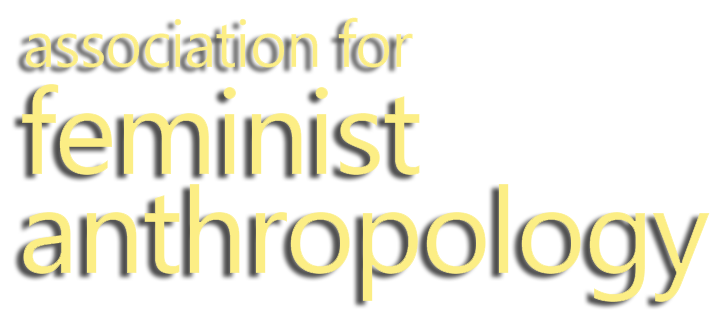Twenty-Five Years of Feminist Anthropology:
A History of the Association for Feminist Anthropology
January 2014
To read and download an updated and expanded account of our history, click here
—————————————————–
Phoenix, 1988: The meeting room was filled to capacity, mostly women, a few men, many of whose names were associated with the first published efforts to bring, in the beginning, an “anthropology of women” and later, a feminist and gendered anthropology to the discipline. These anthropologists, their students, and others like-minded, under the leadership of the AFA’s first Chair, Carole Hill, gave a unanimous vote to the establishment of the Association for Feminist Anthropology.
The first few years of the AFA saw the establishment of several central themes that continue to form the core of members’ interests. The late Sylvia Forman, a founding member of AFA, came up with the idea of “Working Commissions” as a way to organize and link feminist academic and policy work. Working Commissions were soon established on three subjects: Women’s Body Control, Women and Human Rights, and Gender and the Curriculum. The first, renamed the Commission on Women’s Reproductive Rights and Bodily Autonomy, organized panels at AAA meetings, resulting in several publications. The Gender and the Curriculum Commission built on the three-year AAA Gender and Anthropology Project that culminated in Sandra Morgan’s edited collection Gender and Anthropology: Critical Reviews for Research and Teaching. Sylvia Forman initiated, with the Association of Black Anthropologists, the annual Workshops on Teaching about Race and Gender.
A central purpose of the AFA has been the coordination of the many excellent panels presented at the AAA meetings under AFA sponsorship, but scholarship has been only one of the AFA’s several concerns. The AFA has also supported a variety of efforts within the AAA to promote equity, inclusiveness, and human rights. This has included a successful effort to establish child care at the meetings. In some cases, our work has directly addressed the location where we are holding our meetings. In 1990, at the New Orleans meetings, in response to the Louisiana state legislature’s moves to restrict women’s reproductive rights, the AFA Board wrote to then-President Jane Buikstra to make “a state’s stance on women’s reproductive rights an issue in its deliberations on where to hold annual meetings.” In 1992, the AFA urged the AAA board “to address the issue of underemployment and exploitation of both faculty and graduate students in American colleges and universities.” In 2012, the AFA developed a statement that responded to the experience of American University assistant professor Adrienne Pine who had been censured for breastfeeding in her class (ironically in feminist anthropology). The statement not only addressed Pine’s situation, but spoke to the importance of academic institutions providing services that would alleviate pressures on employees who are parents of young children. In 2013, AFA supported a resolution that put the AAA on record as opposing the trend toward contingent labor in academia, with recommendations for establishing more equitable employment practices. The list goes on. AFA has been a force for progressive agendas in the AAA throughout its history, both in connection to issues that are directly connected to gender, and in regard to race, class, and social justice more broadly.
Concrete efforts to promote networking and professional opportunities for AFA members have included, over the past several years, the creation of a mentoring program, travel grants for AFA students who are members of underrepresented groups, the publication of several edited collections honoring the work of feminist anthropologists or documenting influential panels, and the publication of a newsletter, Voices. AFA offers a dissertation award to help support doctoral candidates in the final phase of dissertation preparation on a topic that advances feminist anthropology as well as annual graduate and undergraduate student paper prizes for contributions to the field.
